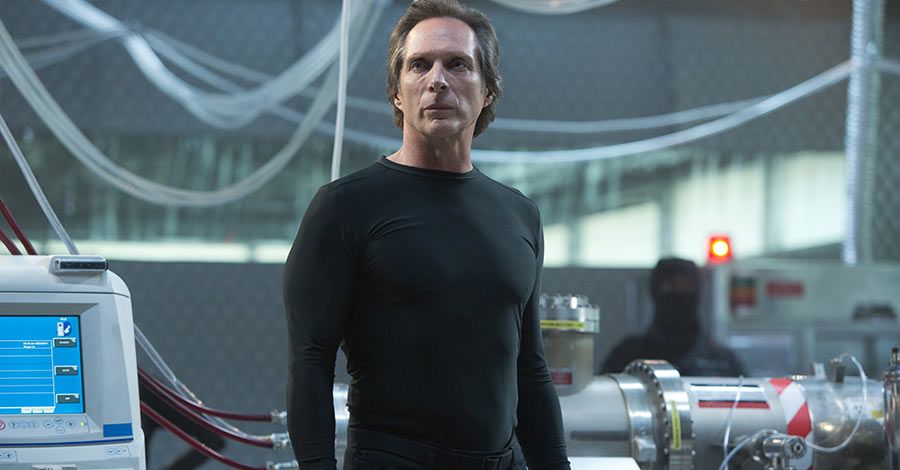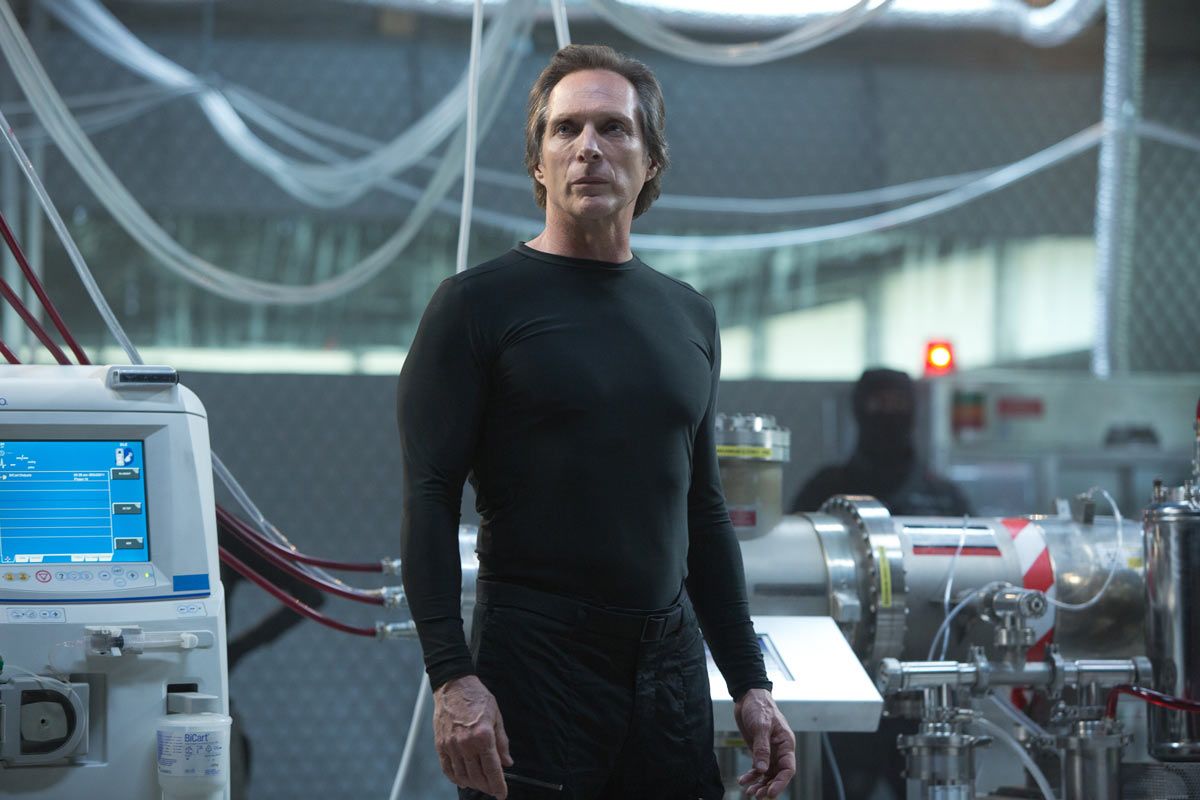If William Fichtner isn't quite a household name, he's most certainly a household face.
With scores of credits in some of the most high-profile films of the past two decades -- including "Heat," "Armageddon," "The Perfect Storm," "Pearl Harbor," "Black Hawk Down," "Crash," "Mr. & Mrs. Smith," "The Dark Knight" and "The Lone Ranger," along with stints on popular TV series like "Prison Break," "Entourage" and "Invasion" -- Fichtner's become one of the most recognizable faces in show biz, and his recent role as an evil tycoon in the latest incarnation of "Teenage Mutant Ninja Turtles," now on home video, will most certainly prompt a brand new generation of fans to welcome him whenever he appears on screen yet again.
CBR News spoke with the veteran actor about his motivation behind taking on his role for "Teenage Mutant Ninja Turtles," his longstanding professional relationship with producer Michael Bay, his roles in genre films and more.
CBR News: William, there are a multitude of reasons that an actor gets excited about taking on a film like this -- the kids love the property, they've loved the property since they were a kid, etc. -- so what was the thing that got you really interested in being a part of this project?
William Fichtner: It was a bunch of things. A lot of it, too, is timing. I remember that I was coming back from New Mexico and got a call that said, "Read this script when you get home, because --" I mean, I was literally at the airport, and he says, "If you like it, you're going to go to New York in a couple of days."
Obviously, I was aware of the Turtles. I hadn't met Jonathan Liebesman before, the director of the film, who's become a really good friend, and I'm a real fan of his. I can't really tell you that there was that one [specific] thing. It was a big movie. It was shooting in New York. I liked the character, which went through some changes to how the film eventually ended up when it got released.
There were enough things all together right then and there where I thought, "Yeah, this seems pretty cool." Also, if I had to pick one factor that probably weighed a little bit more than others, it's that Michael Bay's company was producing it. I'd worked with Michael a couple of times, and I'm a real Michael fan. He just has such a commitment to high excellence that I thought, "Well, if you're going to do a big-ass kids movie like 'Teenage Ninja Mutant Turtles,' I can't imagine anybody better being behind it." Anyway, that was really it. I read it and [thought], "Ah, I think I'm going to go to New York."
What fascinated you? You've done your share of effects-heavy projects and big spectacles. On this particular one, what was the aspect that fascinated you behind the scenes, watching how they pulled it off?
I knew from the beginning that there was going to be a commitment, a way of shooting and what this movie was going to be -- it was going to be live-action. They were going to be real. So if you were a fan of the whole little bouncing-around-turtles -- Teenage Mutant Ninja Turtles -- if you were a fan of that; well, you're really going to be a fan of this, because it's like your cartoon comes to life.
What I thought was really great is that four actors played the parts of the turtles. It's not just four actors wearing motion capture suits. It's four actors, really good actors. Any time you were playing a scene with these Turtles, they had on their motion capture suits and all that, and special effects would fill it all in, but when you were playing scenes, it's not like you were listening to a script supervisor off to the side, somebody giving you lines or just standing there. You had real actors to play moments.
I watch the movie and I think, "Well, of course so many of these moments work in this film, because they worked as moments between actors, in the first place." It was a real commitment to storytelling. Right from the first day that I worked with the Turtles, I thought, "Well, you're already in the ballgame of making this work. You don't need to create this in a lab. These moments are real, and you've just got to fill it in with what these Turtles are going to look like." I thought that was pretty special and obviously something that people were thinking of right off the bat, and it was a smart thing to think of.
You've been involved over the last few years with projects -- like "The Dark Knight" and "The Lone Ranger" and now this -- that are properties that really resonate across generations and, in many cases, go back to people's childhoods. Do you come into projects like those with a sort of different mindset as to how you approach it as an actor, or is it another gig that you just have to figure out the way it's going to work this time around?
Always figuring out how it's going to work this time around. I never really have any preconceptions about [whether] it's going to go this way or that way, because it's almost impossible to do that. Every director is going to have his own thoughts on where he's going to go with it. I missed "The Lone Ranger" as a kid. That series was on TV, and I know there were other movies, and I hadn't seen them. But it's pretty clear when you work with Gore Verbinski what kind of movie he wanted to make, and that's honestly all I'm really interested in.
[It's] the same thing with "Turtles" and Jonathan Liebesman: I just really want to know what kind of movie he wants to make. You know, Michael Bay had a real vision for what he wanted to do with this. I just really wanted to find out, "What's the movie you guys want to make?" Because you have to find that rhythm, because if that's the rhythm they're going to try to put together -- well, don't give them a different rhythm. You want to be in the ballpark of what they're looking at. So that's always an individual thing. I take that one step at a time.
You mentioned your longstanding collaboration with Michael Bay on several films. Tell me a little bit more about what works between you and him. What attracts you to wanting to be a part of his projects?
Well, you know, this is the third time that I had the opportunity to work with Michael. The first two times were "Armageddon" and then I did a little cameo in "Pearl Harbor" for him. But you know, Michael's a perfectionist. He gets a vision. He wants to see it as close to what he's thinking about. I can't imagine that his thoughts are anywhere but that. I look at it the same way. I'm not a phone-in guy. I want to show up and have a definitive sort of thing. I want to fully realize my piece of the puzzle, and obviously he does that, as well, in everything he does. At the end of the day, I think that he directs and produces, and I act, and we all just really want to be at the top of our game, all the time. So, I think that's what we have in common. I'm sure he'd be fine hearing that.
Your face has become so familiar to audiences, and I feel like you get a very warm reception whenever you pop up on screen. Tell me what's it's like to be able to have the career you've had, and yet not have paparazzi chasing you around. What has it been like to be able to have that sort of sweet spot as an actor in Hollywood?
To be honest, if I had anything that could help plan that out, I would've, but I can't, and I don't. They're just things that honestly I don't really think about. I just take it one day at a time. I have a beautiful wife, a couple of boys. I live my life. I want to do solid work. The rest of it, I have no control over. I don't really think about it too much. I'm always looking for more challenging and great things, and -- knock on wood -- that I've had the opportunity to work on enough things that you could ask that question. Twenty years from now, I hope you're asking it again.
"Teenage Mutant Ninja Turtles" is available now on home video.


